Indian Law
Download Our App ! for Multiple-choice questions (MCQs) on Indian Law
Indian Law and its Structure
Indian Law : The Indian legal system is one of the oldest legal systems in the world. The Indian legal system is based on the English common law system, but it also has influences from the Roman, Islamic, and Hindu legal systems. The Indian legal system is divided into two main categories: civil law and criminal law.
Civil law deals with disputes between individuals, organizations, or the government. Criminal law deals with crimes that are committed against the state or against individuals. The Indian legal system is divided into four levels: the Supreme Court, the High Courts, the District Courts, and the Village Courts. The Supreme Court is the highest court in the Indian legal system. It is located in New Delhi, and it consists of a Chief Justice and 25 other judges. The Supreme Court has the power to hear appeals from the High Courts and to give advisory opinions on legal matters.
The High Courts are the second highest level in the Indian legal system. There are 24 High Courts in India, and each High Court has jurisdiction over a specific geographic area. The High Courts have the power to hear appeals from the District Courts and to give advisory opinions on legal matters. The District Courts are the third level in the Indian legal system. There are more than 600 District Courts in India. The District Courts have the power to hear civil and criminal cases. The Village Courts are the fourth and lowest level in the Indian legal system. There are more than 200,000 Village Courts in India. The Village Courts have the power to hear civil and criminal cases. Download Our App ! for Multiple-choice questions (MCQs) on Indian Law.
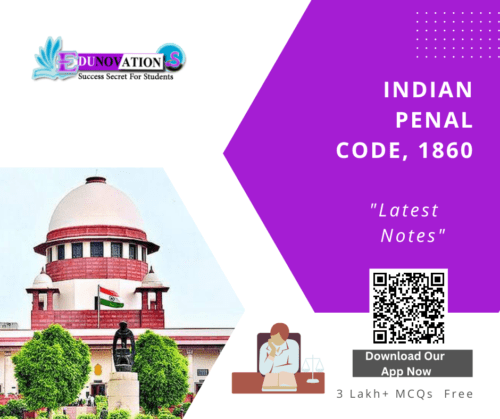
Indian Penal Code, 1860
The Indian Penal Code (IPC) is the main criminal code of India. It is a comprehensive code intended to cover all substantive aspects of criminal law. The code is very widely adopted in a majority of Asian countries.
Administrative Law in India
The Administrative Law of India refers to the body of law that governs the administration of the government of India. It is based on the constitutional mandate that the executive branch of the government be responsible for the governance of the country. The Administrative Law of India includes the laws and regulations relating to the organization and functioning of the government, as well as the rules and principles governing the relationships between the government and the people.


Criminal Procedure Code (CRPC)
The Criminal Procedure Code (CRPC) is the procedural law governing the investigation and trial of criminal cases in India. It was enacted in 1973 and came into force on 1 April 1974. It provides the framework within which criminal proceedings are conducted in India.
The Criminal Procedure Code (CRPC) is a set of rules and regulations governing the administration of criminal justice in India. It lays down the procedures to be followed by the police, the courts and the jail authorities in the investigation, trial and sentence of a criminal case. The Code also contains provisions for the release of accused on bail and parole, and for the protection of witnesses and victims of crime.
Indian Constitutional Law
The Indian Constitutional Law is the supreme law of India. The Constitution is the framework for political principles, procedures, and powers of government. It lays down the framework defining fundamental political principles, establishes the structure, procedures, powers, and duties of government institutions, and sets out fundamental rights, directive principles, and the duties of citizens. It is the longest written constitution of any country in the world, with 395 articles and 12 schedules.
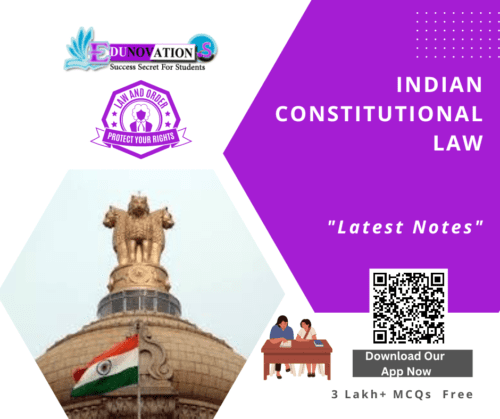

Indian Evidence Act
The Indian Evidence Act, 1872, is a central act of the Parliament of India which lays down rules of evidence. It is applicable to all judicial proceedings in or before any court including the High Court and the Court of Session.
The Indian Evidence Act, 1872, governs the admissibility of evidence in criminal and civil proceedings in India. It is divided into five sections, with Section I dealing with the general principles of admissibility; Section II with the relevancy of evidence; and so on. The Act has been amended several times, most recently in 2013.
Code of Civil Procedure 1908 (CPC)
The Code of Civil Procedure is the law that govern how civil lawsuits are conducted in the United States. It sets out the rules for how a case proceeds from start to finish, including how discovery (the process of gathering evidence) works, what kind of motions can be filed, and how trials are conducted.
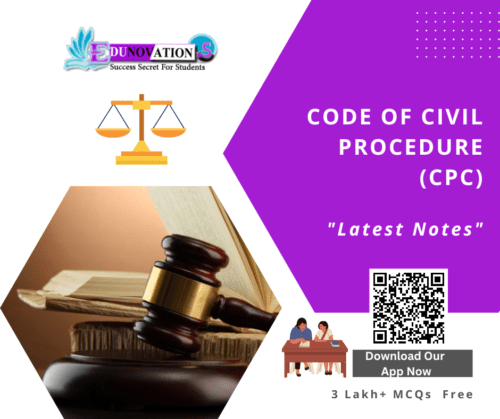

Civil Procedure Code and Juvenile Justice ACT and Probation of Offenders ACT
This page gives an overview of the Civil Procedure Code and Juvenile Justice Act and the Probation of Offenders Act. It explains the key provisions of each Act and how they relate to each other. It also outlines the main differences between the two Acts.
The Civil Procedure Code (CPC) is the law that governs the procedure of the civil courts in India. It is a comprehensive code that applies to all civil proceedings in the country. The code is divided into two parts: the first part contains the general rules and the second part contains the special rules. The Code of Civil Procedure is a Central Act and it applies to the whole of India.
Click here for Notes on Civil Procedure Code and Juvenile Justice ACT and Probation of Offenders ACT
Civil Procedure Code and Limitation ACT
The Civil Procedure Code and Limitation Act lay down the procedural law governing the administration of civil justice in India. The Code of Civil Procedure is a central legislation that provides for the entire gamut of procedures to be followed in civil courts in India. The Limitation Act provides for a uniform statute of limitations for all civil courts in India.
Click here for Notes on Civil Procedure Code and Limitation ACT
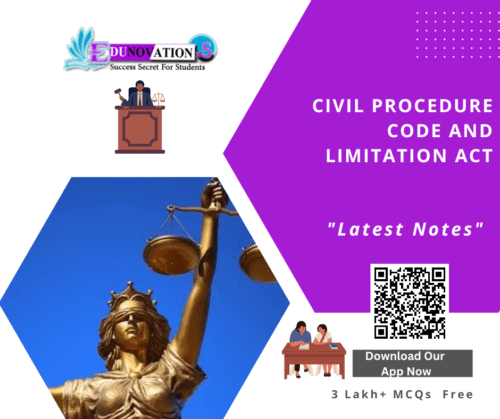

Interpretation of Statutes
The interpretation of statutes is the process by which courts interpret and apply legislation. This process is also known as statutory interpretation. Courts interpret statutes by looking at the plain meaning of the text of the statute. If the meaning of the text is clear, then the court will apply the statute as written. If the meaning of the text is unclear, then the court will look to other sources, such as the legislative history of the statute, to interpret the statute.
Jurisprudence
Jurisprudence is the study of law and the application of law. It is the study of the nature of law, the relationship between law and society, and the functions of law in society. It also includes the study of the sources of law, the structure of the legal system, and the Legal process.
In legal academia, jurisprudence is the study and theory of law. Scholars of jurisprudence aim to explain the nature of law in its most general form and provide a comprehensive, coherent account of its underlying principles. Modern jurisprudence began in the 18th century and was significantly influenced by the work of the philosophers Immanuel Kant and Jeremy Bentham.
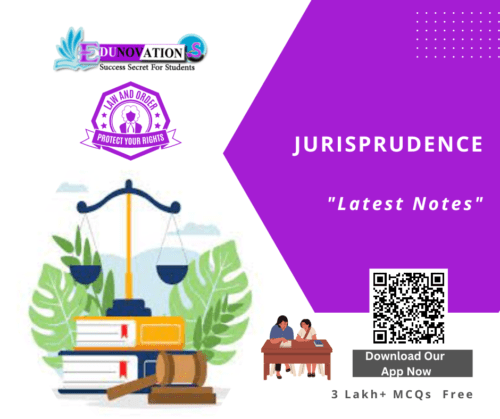

Company Law
This is a page for notes on company law. Company law is the area of law that governs the formation, operation, and dissolution of companies. The law governing companies is divided into two main branches: public and private. Public companies are companies that are listed on a stock exchange, while private companies are not. The main difference between the two is that public companies are required to disclose their financial information to the public, while private companies are not.
Comparative Criminal Procedure in India
This page will explore the criminal procedure systems of various countries and compare and contrast their similarities and differences. It will provide an overview of the various steps in the criminal procedure process, from investigation to trial to sentencing. By understanding the different criminal procedure systems around the world, we can better appreciate the strengths and weaknesses of our own system.


Human Rights and International Law
Human Rights and International Law is the study of international law as it relates to human rights. It is a growing field of study that encompasses a wide range of topics, including the protection of human rights in armed conflict, the responsibility of states to uphold human rights, and the role of international organizations in promoting and protecting human rights.
Family Law in India
In India, family law is based on the religion of the parties involved. Muslims have a personal law known as Muslim law, which is derived from the Quran and other Islamic scriptures. Hindu law is based on the scriptures of the Hindu religion. Christian law is based on the Bible and other Christian scriptures.
This Page contains an overview of the main points of Indian family law. It is not a comprehensive guide, but covers the most important topics. The topics covered include: marriage, divorce, child custody, dowry, and adoption.

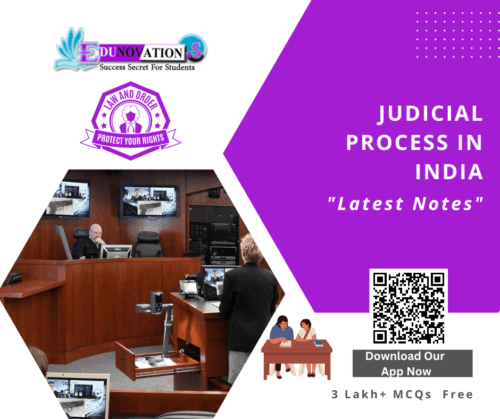
Judicial Process in India
The judicial process is the system of law that interprets and applies the law to resolve legal disputes. It is the means by which disputes are resolved in a court of law. The judicial process is composed of a number of steps, including the filing of a complaint, the service of process, the filing of a response, the discovery process, the trial, and the appeals process.
Labour Laws in India
The Labour laws in India regulate the employer-employee relationship and are Hindu-centric. They are based on the grill system, where the workers are bound to the employer through a contract and cannot change jobs without the employer’s permission. The main labour laws are the Industrial Disputes Act, 1947, the Trade Unions Act, 1926, and the Industrial Employment (Standing Orders) Act, 1946. These laws protect the workers’ rights, but there are many loopholes that employers can exploit.


Land Laws in India
Land laws in India are a set of statutes that regulate the ownership and use of land in the country. They are based on the law of property, which is a branch of civil law. The law of property is a system of rules that governs the rights of people to own, use, and transfer property.
The Indian Constitution recognises the right to property as a fundamental right. The land laws in India are codified in the Indian Penal Code, 1860, the Code of Civil Procedure, 1908, the Indian Evidence Act, 1872, and the Registration Act, 1908. These statutes are administered by the courts.
The land laws in India are constantly evolving, in line with the changing needs of the society. The latest development in this regard is the enactment of the Real Estate (Regulation and Development) Act, 2016, which aims to protect the interests of home buyers and to promote the growth of the real estate sector.
Law and Social Transformation in India
Law and social transformation in India has a long and complex history. The Indian legal system is one of the oldest in the world and has undergone many changes over the centuries. India’s legal system is based on a mix of common law, statute law, and customary law. This mix is often referred to as the ” Anglo-Indian legal system”. The primary sources of law are the Constitution of India, judicial precedents, and legislation.
The Constitution of India is the supreme law of the land. It lays down the framework for the legal system and establishes the rule of law in the country. The Constitution is the source of authority for all laws in India.
Judicial precedents are another important source of law. They are binding on all courts in India and provide precedents for future cases.
Legislation is the third source of law in India. Parliament enacts laws and these are binding on all citizens of India.
Click here for Notes on Law and Social Transformation in India


Legal Education and RM in India
Legal Education in India is imparted through various law schools and colleges. In India, RM refers to the system of legal education and is regulated by the Bar Council of India. Legal education in India starts with a 3-year degree course in law followed by a 2-year Master’s degree in law. After completing the degree course, students have to undergo a professional training course called Bar Professional Training Course (BPTC) and then appear for the All India Bar Examination (AIBE). Successful completion of the AIBE allows a person to practice law in India.
Penology – Treatment of Offenders in India
Penology – treatment of offenders
Penology is the study of the treatment of offenders and the operation of criminal justice systems. In India, penology includes the treatment of offenders in the criminal justice system as well as the study of crime and its prevention.
The penal system in India is based on the premise that offenders should be reformed and rehabilitated and not merely punished. The main objective of penology in India is to reform the offender and make him/her a productive member of society. Treatment of offenders in India is thus based on the principles of restorative justice.
Click here for Notes on Penology Treatment of Offenders in India


PIL and HR in India
PIL and HR: since its inception in 1980, public interest litigation
(PIL) has been an important tool for protecting human rights in India.
In recent years, the Indian Supreme Court has issued a
number of important rulings in PIL cases, including a decision declaring the
right to privacy to be a fundamental right, and a ruling mandating the registration of FIRs in cases of dowry death and dowry harassment.
Despite its successes, PIL faces a number of challenges in India. The most significant of these is the increasing use of PIL by private interests, rather than by public-minded activists and NGOs. This has led to a proliferation of frivolous and vexatious PILs and has diverted the attention of the courts away from genuine cases of human rights violations.
Business Laws in India
The notes page for “Business Laws in India” contains important information and resources for anyone interested in doing business in India. Topics covered include: – An overview of the business legal landscape in India – The major business laws in India – Important resources for understanding and complying with business laws in India.
The business laws in India are a set of rules and regulations that govern various aspects of starting and running a business in India. These laws are designed to protect the interests of businesses and consumers, and to promote fair and efficient market competition.


Income tax procedure pleading Book Keeping and Accountancy
Income Tax Procedure is the set of rules and regulations which govern the levy, assessment and collection of income tax. It lays down the procedure for filing of return, assessment, appeal and revision. The main objective of income tax procedure is to ensure that the tax is levied and collected in a systematic and uniform manner.
Click here for Notes on Income tax procedure pleading Book Keeping and Accountancy
